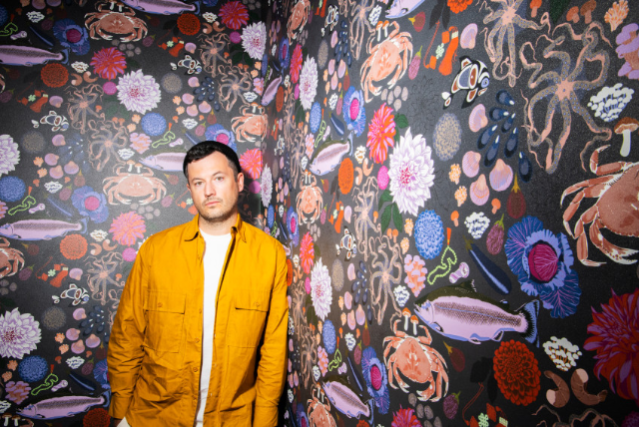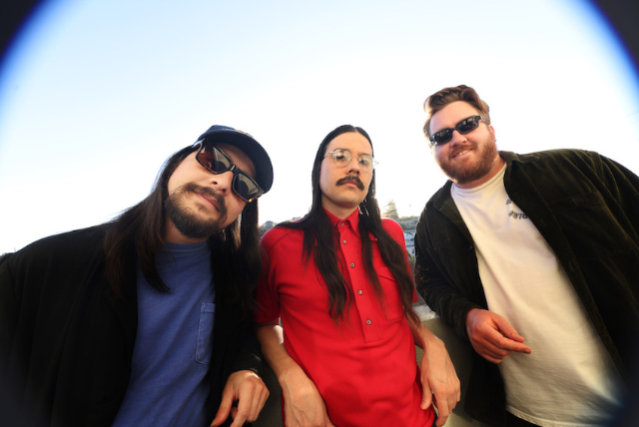
SYML’s music has a sacred quality. The solo venture of Seattle artist Brian Fennell, its themes tap into the instincts that drive us to places of sanctuary, whether that be a place or person. “It comes back to your identity of being human; throughout time we’ve shared the same drive,” he explains. His own upbringing – interwoven with experiences of abandonment, adoption, loss, grief and love – is what drives him to question how connections between people shape us as individuals.
“We have this awesome capability to be conscious and know what it is to be here,” the 39-year-old believes. This outlook helped him process the death of his adoptive father in 2021, as well as be there for his friends and family. It transpired in his haunting, grief-stricken EP, DIM, written and released during that year, and now a new collection of songs, The Day My Father Died. “They’re pretty close in their creation point,” Fennell explains. “But the way they differ is, the first one carries the pain and confusion, and the album is actually light, at least for me.”
Those familiar with SYML’s earlier work – including his self-titled debut album released in 2019 – will recognise this reference to a sound embedded more in the darker folk and rock realms. Songs such as the compelling “Clean Eyes” were driven by electric guitar licks, propulsive rhythms and a lower, more urgent style of vocal delivery. “Break Free” was an early demonstration of his fascination with our more carnal instincts, revelling in squalls of guitar and a heady thrum of bass. In between these tracks was the startlingly beautiful “Where’s My Love”, swept up in bright piano notes, swoons of double bass and Brian’s affecting falsetto. The song now has more than a billion streams, a testament to the emotional potency of his songwriting.
The Day My Father Died is an exceptional record. Over 15 songs, SYML offers a profound exploration of the ways in which our lives intertwine. It opens on the devotional “Howling”, a steadily unfolding paean delivered in his unique, reverent falsetto: “Keep me howling, baby / I’ll be your beast, I’ll be your dog / Keep me howling, baby / And I’ll keep begging you for more.” His spectacular vocal acrobatics are swathed in swooning gospel harmonies that build to an ecstatic choir, mingling with Fennell’s own hair-raising cries: “My blood and my body will sing out your praises / Save me, save me, save me.”
“It’s about worshipping your partner, wanting to be saved by their beauty,” he says of the track. “That idea of being insatiable… we’re often told that’s a sinful thought, something hedonistic. But you’re this hurricane of sexuality and fulfilment – being fulfilled by someone else. I love that storm.”
Throughout the album, SYML weaves in familiar iconography as a means of examining his feelings towards others, and about himself. Raised in Seattle, he attended church “more as a social club than anything else”, and as a means of playing guitar to an audience. While he’d known he was adopted for as long as he could remember – “it was as much a part of my identity as my name” – he began to struggle with feelings of abandonment when he turned 18. “I had all the confidence in the world, but at the same time I felt very exposed,” he says. “It was around that time that music became a bigger part of my life, when I started using it as a tool to express feeling.” That same year, he was given a six-page letter written to him from his birth mother, and he discovered she and his birth father were Welsh (SYML is the Welsh word for “simple”). The letter had left places blank where his name should have been: “That’s what got me. I was this placeless, nameless thing, and thankfully someone took me in.”
In the tender “Sweet Home”, SYML pays tribute to his adoptive father through nostalgic nods to the songs – by Simon and Garfunkel; Crosby, Stills and Nash – he would play in the family home. Delicate guitar picking unfurls like sweet-scented blooms, harmonies drift as easily as clouds on a summer breeze. “It came very quickly,” Brian says. “People’s sense of home is as varied as we are as individuals. The sense of welcoming somebody home is in itself a place of peace, literal or metaphorical. It’s like a wish for people, especially now when there are those living in parts of the world where those homes are destroyed or under threat.”
Listeners will note the accomplished guitar work on the album, something Fennell says “took forever” to get right. “I have a standard of excellence I hold myself to,” he admits. For The Day My Father Died, he enlisted the skills of renowned indie producer Phil Ek (Fleet Foxes, Built to Spill, Band of Horses), whom SYML had admired since recording with his first band, Barcelona. “To me, this album feels very cohesive,” he says, crediting Ek with helping him achieve that effect, recording in studios – including a former church – around Seattle. It took a lot of work: “I was like an athlete for a few days,” he recalls with a laugh. “My fingers became stubs, my arms locked up… It took real grit and commitment between me and Phil to get the album to this point.”
What is immediately apparent is how SMYL has known when to lean into his more ornate, richly textured compositions and when to pare things back. The latter transpires in “You and I”, an Americana-indebted patchwork of simple guitar-picking and unadorned lyrics. “I love that style because there’s no distraction,” he says. “It’s a vessel of a sweet message that, ‘My life started its current season when I met you – when you found me.’ Endearing yourself to someone through being honest.” On “Better Part of Me”, he pokes gentle fun at our preconceived notions of what marriage will be, and the revelations each day that the reality is so much better. The romanticism of “Marion”, a rousing alternative rock number, is a “distilled version” of how he met his wife, encapsulating the coup de foudre, the “shot to the heart” that hits us right when we’re least expecting it. Here, Fennell brings into play the Adam and Eve imagery he feels is “beautifully human”, written to depict our intrinsically fallible natures.
Perhaps one of the most intriguing songs on the record is “Corduroy”, a sun-dappled recollection of childhood. “It has a very maternal feel, for me,” he says. “Putting yourself back into that position gives you this kind of moral reset, like you almost need a mother’s filter. I have that mentality as a parent, this idea of, through all things: choose to love.” Far from gloomy listening, the title track soars, propelled by buoyant guitar-picking and SYML’s defiant, life-embracing call, remembering his father’s words: “I want to show you that life comes in circles / I want to show you life / Drink all your whisky and spend all your money / And let no one steal your shine.”
“It’s really more of a celebration than mourning,” Brian says. “It’s like a kid being born. When someone significant to you leaves, it’s like, well, my life will now be changed because of this.” He observes that this is less of a “new me” experience and more, “How does my lens shift, how do I live beyond this?” The ones closest to us, he says, act as “a kind of lens for you – so when that’s removed, it’s very immediate because you see and hear things differently”.
In a different way, “Tragic Magic” tackles the moments our eyes are opened to a more brutal reality. “It’s about being marketed Christianity in the Nineties,” he explains. “I was never really on fire for it, but I was a part of it – I fell right in! And looking back, the amount of money and effort that went into this industry that was cranking through these young souls… Maybe it did protect me from another path, but really it’s a magic show, and you’re a willing participant.” Armed with a new perspective, Fennell wanders amid soft guitar strums, crooning iterations of what he was told to believe as a teenager, being “high all summer long”.
“I think at the core of why I make music is to try and be as honest as possible, in terms of what I’ve experienced,” he says. “This record comes from a place of wanting to bring down defences between us and our experiences.”



